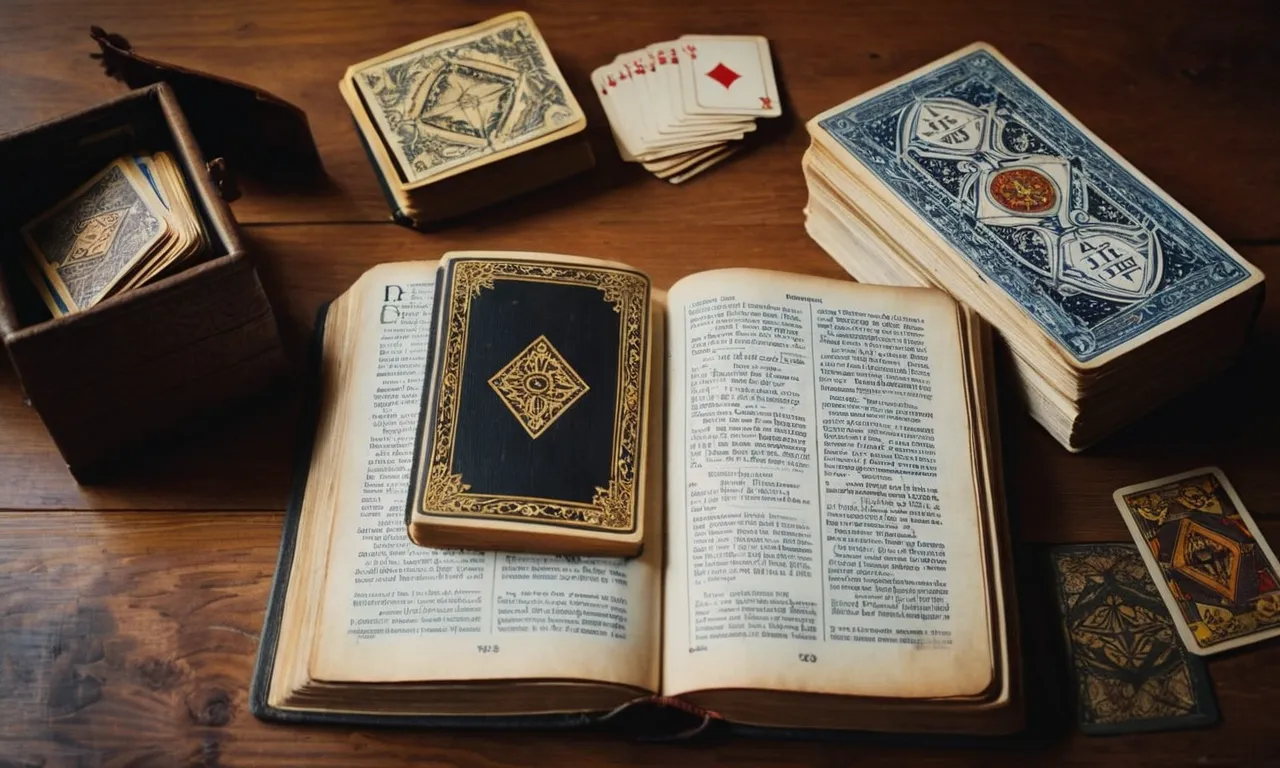What Does The Bible Say About Tarot Cards?
The use of tarot cards has been around for hundreds of years, with origins dating back to the mid-15th century in Europe. Even though tarot was created as a card game, over time, the cards took on divinatory meanings used for occult and esoteric practices.
Many Christians wonder if tarot cards are acceptable according to biblical teachings. If you’re short on time, here’s a quick answer to your question: The Bible does not directly mention tarot cards, but many verses suggest that tarot cards should be avoided by Christians.
In this comprehensive article, we will analyze several bible verses that relate to practices like tarot reading to determine what guidance the bible provides on the topic. We’ll examine both Old and New Testament passages to gain a thorough perspective.
Additionally, we’ll explore the origins of tarot cards and their common uses today. With an open mind, let’s dive into a thoughtful consideration of what the bible says about tarot cards.
Origins and History of Tarot Cards
Early Beginnings in 15th Century Italy
The first known tarot cards were created in the mid 15th century in northern Italy. Although the exact origins are unknown, it is believed that tarot cards started out as playing cards. The earliest evidence indicates that the first decks, comprised of hand painted cards, depicted symbols, numbers, and four suits representing Catholic virtues: cups, coins, wands, and swords.
Evolution from Card Game to Divination Tool
Over the following century, tarot became popular as a trick-taking game similar to bridge across France, Germany, and Italy. However, in the late 18th century, tarot underwent a remarkable transition from being largely considered a game to being used by secret societies and mystics for divination and spiritual purposes.
There are numerous theories for this transformation. Some historians believe that early occultists saw parallels between the symbols and numbers on the cards and certain esoteric mystical principles. Others point to links with Egypt and Thoth, the ancient god of magic and wisdom.
Tarot Designs and Symbolism
In terms of designs, the Rider-Waite tarot deck from 1910 kickstarted the concept of illustrations on all 78 cards featuring rich symbolic imagery. While the number of cards remained 78, subsequent decades saw immense creative experimentation in tarot styles and themes, taking inspiration from:
- Angels and spirituality
- Fantasy, fairytales, and fiction
- Astrology
In addition, tarot symbolism grew to encompass:
| Element | Symbol |
|---|---|
| Fire | Passion, creativity, ambition |
| Water | Emotions, intuition, healing |
| Air | Intellect, communication, social connections |
| Earth | Practicality, finances, physical world |
This rich symbolism allows readers to interpret cards in spiritual, emotional, practical, and interpersonal contexts during tarot readings.
Common Types of Tarot Readings
The Major and Minor Arcana
The tarot deck consists of 78 cards divided into the Major Arcana (22 cards) and the Minor Arcana (56 cards). The Major Arcana represents significant life events and turning points, while the Minor Arcana deals with day-to-day activities.
Card Spreads and Layouts
There are many different tarot spreads, which determine how the cards are laid out and interpreted. Some popular spreads include:
- The Three Card Spread – Provides insight into past, present and future
- The Celtic Cross Spread – One of the most detailed and complex spreads, arranged in a cross shape
- The Horseshoe Spread – Shaped like a horseshoe and provides an overview of a situation
The number and positions of the cards in a spread carry meaning. The same cards can have different interpretations based on their placement in the layout.
Interpreting Upright and Reversed Cards
Each tarot card has a distinct meaning when upright, but the interpretations can shift completely if the card is reversed (flipped over). Upright cards generally represent positive or favorable meanings, while reversals indicate blocks, delays or negative influences.
For example, the upright Lovers card signifies harmony and meaningful connections, while the reversal warns of bad decisions in relationships. Reversed cards prompt self-reflection to overcome obstacles or problems.
Bible Verses Seemingly Against Tarot Cards and Divination
Old Testament Warnings Against Divination Practices
The Old Testament contains several verses that warn against divination practices like tarot card reading. For example, Leviticus 19:26 states, “Do not practice divination or seek omens.” Deuteronomy 18:10-12 similarly says, “Let no one be found among you who sacrifices their son or daughter in the fire, who practices divination or sorcery, interprets omens, engages in witchcraft, or casts spells, or who is a medium or spiritist or who consults the dead.”
These verses paint divination and occult practices as sinful and contrary to following God.
Some prophets like Isaiah also condemned divination, such as in Isaiah 2:6 which says, “They are full of superstitions from the East; they practice divination like the Philistines and embrace pagan customs.” Jeremiah 14:14 warns of “prophets who prophesy lies in my name.”
The prevalence of these verses suggests the Old Testament authors looked upon divination as deceitful and opposed to Godly living.
New Testament Lists Divination as a Sin
The New Testament continues to identify divination and sorcery as sinful practices. In Acts 8, Simon the Magician practiced sorcery and divination but was rebuked by Peter for believing he could “buy the gift of God with money.”
Simon was told to repent for his wickedness, indicating that sorcery was deemed sinful. Additionally, divination is included in lists of sinful acts. In Acts 19:19, people burned their magic and divination tools in response to hearing God’s word.
Galatians 5:19-21 lists witchcraft and sorcery among the “acts of the flesh” along with idolatry, hatred, envy, and carousing.
Some interpret the cutting down of the spirit of divination in Acts 16 as a rebuke against such practices. In this story, Paul cast a spirit of divination out of a slave girl “in the name of Jesus Christ,” silencing her supernatural fortune-telling abilities.
This passage condemns exploitation through divination rather than divination as a whole, but still demonstrates the early church’s wariness toward such mystic arts.
Sorcery and Magic Use Condemned in the Bible
Beyond divination itself, the Bible contains approximately 60 verses referring to magic, sorcery, witches, and wizards – always in a negative light. Deuteronomy 18:10-12 not only forbids divination but lists wizards and practitioners of witchcraft along with mediums and spiritists as groups to avoid.
In 2 Kings 17:17 and 1 Chronicles 10:13, consulting mediums and spiritists is seen as evil. Exodus 22:18 commands, “Do not allow a sorceress to live.” All mentions of magic arts and sorcery paint them as contrary to righteous living.
The book of Revelation takes an apocalyptic view of sorcery, listing sorcerers among the condemned in Revelation 21:8 and 22:15. The great end times “Babylon” is condemned for its magic potions and sorcery according to Revelation 18:23.
Though figures like Simon the Magician converted in Acts, the Bible resoundingly treats magic and sorcery as evil practices that follow or exploit forbidden spiritual powers rather than God. With tarot directly tied to divination, mystic symbols, and occultassociations, biblical authors would likely put tarot reading in the category of forbidden magic and sorcery.
Alternative Perspectives on Tarot Cards for Christians
Focusing on Tarot as a Reflection Tool
Many Christians view Tarot cards strictly as a form of divination – a practice forbidden in the Bible (Deuteronomy 18:10). However, some argue that Tarot can be used simply as a tool for self-reflection, without any occult associations.
The evocative imagery on the cards can help people tap into their intuition and explore aspects of their psyche. This perspective sees Tarot as similar to dream symbolism – a means to increase self-understanding that is open to a Christian interpretation.
Of course, Christians who are uncomfortable with Tarot imagery could use alternative card decks with more neutral symbols.
Using Card Symbolism Without Divination
Another approach is using Tarot purely for the archetypal symbolism, without any attempt to “foretell the future.” Drawing a card, reflecting on its imagery, and pondering how its meaning might apply to one’s life can be a thought-provoking spiritual exercise.
Just as biblical passages can speak to people in different ways at different times, Tarot cards can serve as a jumping off point for self-examination. However, Christians who take this approach emphasize the importance of checking one’s interpretations against scripture and not treating the cards as bearing divine messages.
Approaching With Wisdom and Discernment
Some Christians acknowledge that while occult uses of Tarot are forbidden, the cards themselves are not necessarily harmful. They argue that Christians can cautiously use Tarot for reflection and meditation, so long as they have spiritual discernment.
Just as Paul said an idol is nothing but a piece of wood (1 Corinthians 8:4), Tarot is simply paper and ink – any power comes from the intentions of the user. However, Christians should be careful to avoid superstitious approaches and always test impressions against the Bible.
Additionally, those new to faith or struggling with discernment are generally encouraged to avoid Tarot and other potentially questionable practices.
Summary of Biblical Guidance About Tarot Cards for Christians
The Bible does not directly mention tarot cards, but it does provide guidance that Christians can apply when considering practices like tarot card reading. Here is a summary of key biblical principles for Christians to prayerfully reflect on.
Avoid False Guidance
Christians believe the Bible teaches that guidance should come from God and His Word (2 Timothy 3:16-17). Seeking guidance from sources like tarot cards can open one up to false guidance from deceiving spirits (1 Timothy 4:1).
The Bible warns against practices like divination and sorcery (Deuteronomy 18:10-12).
Test Spirits and Teachings
The Bible encourages Christians to test all spirits and teachings to see if they align with scripture (1 John 4:1-3). Since tarot cards and readings do not originate from God or the Bible, Christians believe their guidance should be rejected after testing it against scripture.
Caution Regarding Unknown Spiritual Sources
The sources of tarot card readings are unfamiliar spirits. However, the Bible says Christians should avoid consulting with mediums or spiritists due to the unknown dangers of interacting with unfamiliar spirits (Leviticus 19:31).
Christians believe interacting with unfamiliar spirits through tarot invites potential spiritual harm.
Seek God’s Will According to His Word
The Bible teaches God’s will and guidance are revealed through His Word (Psalm 119:105), godly counsel (Proverbs 15:22), fervent prayer (James 1:5), and circumstantial doors He opens and closes (Acts 16:6-10).
Christians believe God has given these trustworthy means for determining His will rather than alternative practices like tarot.
Based on key biblical principles and warnings, most Christians advise others to prayerfully avoid using tarot cards. Instead, Christians encourage seeking godly counsel and wisdom, praying for guidance, and discerning God’s will through scripture and open and closed doors.
Conclusion
For Christians seeking to honor God with their lives, tarot cards present a complex issue given their long history intertwined with divination practices. While the Bible does not directly forbid tarot, many relevant verses suggest divination and occult practices should be avoided by followers of Christ.
However, some Christians find value in tarot for self-reflection, mental focus or art appreciation when used without divination attempt. As with many issues where the Bible does not provide definitive yes or no answers, Christians seeking wisdom about tarot cards should carefully study scripture, pray for discernment and consider whether tarot brings them closer to or farther from God.








